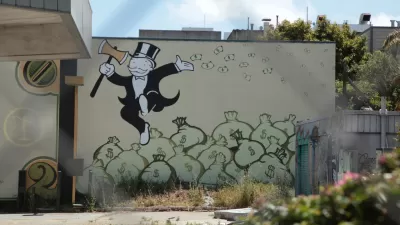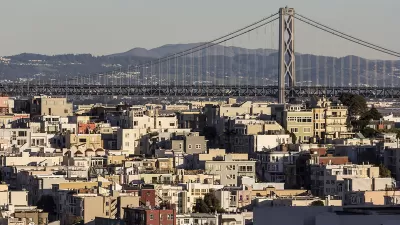Prospects for solving the Bay Area's severe housing shortage look far off. Action on the state level may be one way to approach this crippling collective action problem.

Facing some of the nation's highest prices, the Bay Area has become ground zero for the housing crisis. SPUR president Gabriel Metcalf writes, "The problem was that we needed to figure out where all the newcomers could live without pushing existing residents out. And in this fundamental task of urban governance, we have failed terribly."
Tracing the problem's history, Metcalf defends his organization. "SPUR began sounding the alarm in the late 1970s. Following a citywide downzoning and the early signs of gentrification in some San Francisco neighborhoods, it was clear that the city was headed for a housing shortage."
Ideally, Metcalf writes, the Bay Area would build more housing "at all income levels." To get there, he cites putative policies that encourage density, make places more walkable, fund affordable housing, and defend residents from displacement. Quite a wish list, to be sure.
Metcalf acknowledges the issue's entrenched difficulty, calling the housing shortage a collective action problem with no easy local solution. He wants to see solutions that reach beyond the Bay Area. One example: a new state-level framework for housing approvals, "one that strengthens state housing targets for regional and local governments and makes infill housing easier to build, along with reforming the tax system by letting cities keep more of the residential property tax and rewarding cities that build densely enough in transit-oriented locations."
FULL STORY: The Permanent Housing Crisis

Alabama: Trump Terminates Settlements for Black Communities Harmed By Raw Sewage
Trump deemed the landmark civil rights agreement “illegal DEI and environmental justice policy.”

Study: Maui’s Plan to Convert Vacation Rentals to Long-Term Housing Could Cause Nearly $1 Billion Economic Loss
The plan would reduce visitor accommodation by 25% resulting in 1,900 jobs lost.

Why Should We Subsidize Public Transportation?
Many public transit agencies face financial stress due to rising costs, declining fare revenue, and declining subsidies. Transit advocates must provide a strong business case for increasing public transit funding.

Wind Energy on the Rise Despite Federal Policy Reversal
The Trump administration is revoking federal support for renewable energy, but demand for new projects continues unabated.

Passengers Flock to Caltrain After Electrification
The new electric trains are running faster and more reliably, leading to strong ridership growth on the Bay Area rail system.

Texas Churches Rally Behind ‘Yes in God’s Back Yard’ Legislation
Religious leaders want the state to reduce zoning regulations to streamline leasing church-owned land to housing developers.
Urban Design for Planners 1: Software Tools
This six-course series explores essential urban design concepts using open source software and equips planners with the tools they need to participate fully in the urban design process.
Planning for Universal Design
Learn the tools for implementing Universal Design in planning regulations.
Caltrans
Smith Gee Studio
Institute for Housing and Urban Development Studies (IHS)
City of Grandview
Harvard GSD Executive Education
Toledo-Lucas County Plan Commissions
Salt Lake City
NYU Wagner Graduate School of Public Service





























